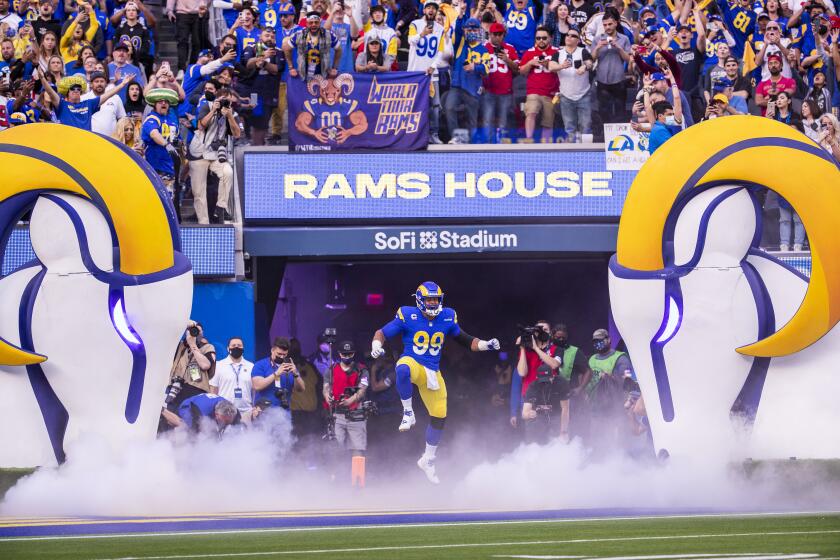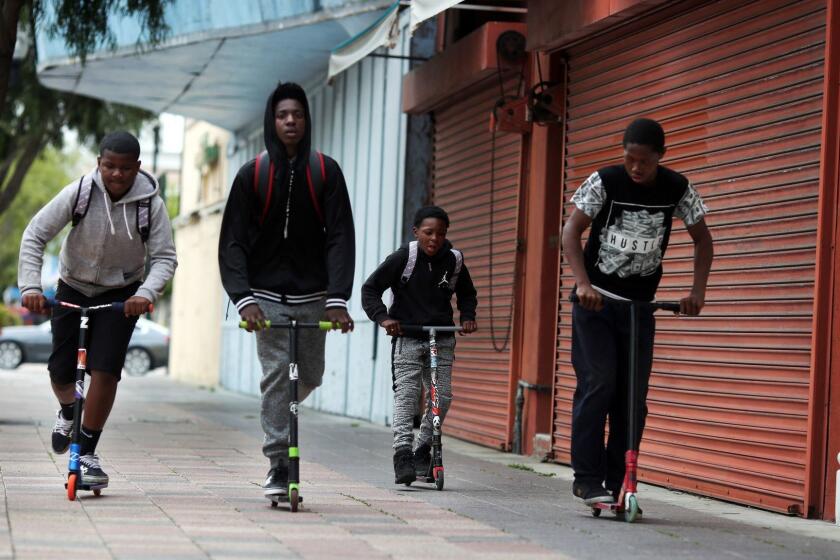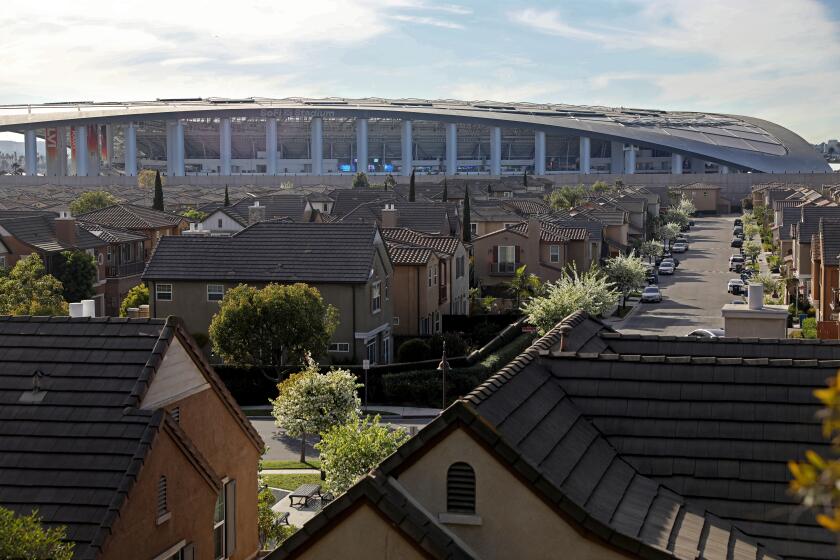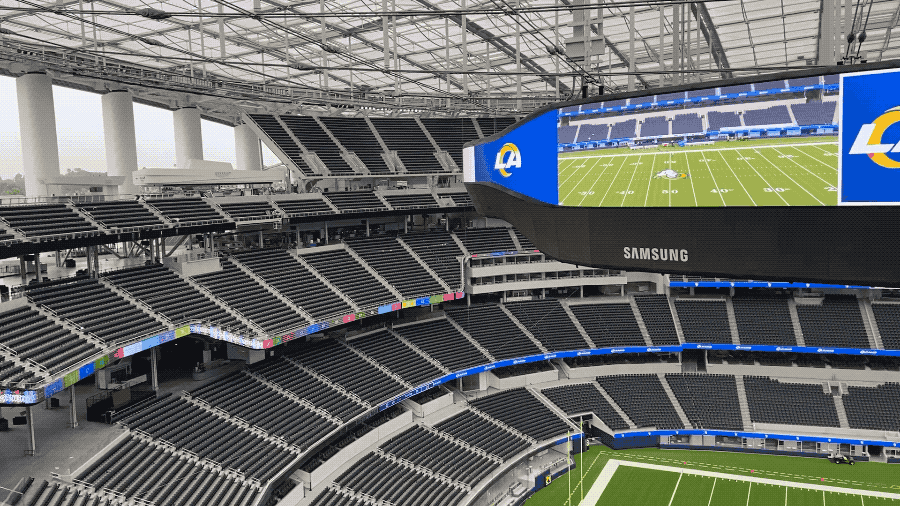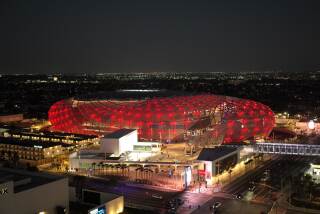For Inglewood, it won’t be a Super Sunday
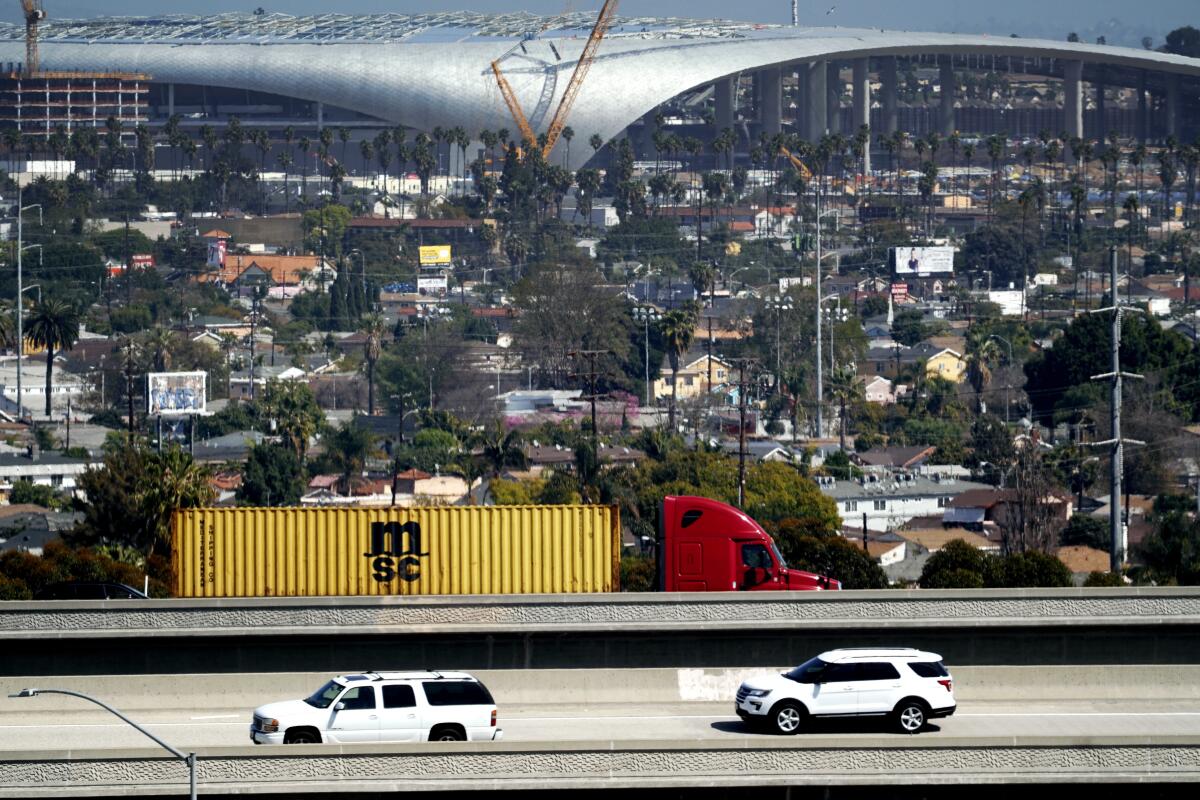
- Share via
In the cold war between SoFi Stadium and Inglewood, my hometown is losing.
To help tally the score, look back to 2004, when Inglewood grabbed the national spotlight as the rare small city to reject the famously predatory advances of Walmart. The biggest company in the world was looking to build a Supercenter on the empty acres next to Hollywood Park racetrack, trying to slip it past the usual rules and regulations.
The scheme went before Inglewood voters as a ballot measure, which Walmart was confident it would win — it had the support of many city officials, not to mention millions to spend on a “yes” campaign that all but promised to deliver freedom and justice to Black and brown people in the form of hourly jobs and cheap goods. But Walmart lost.
The David-over-Goliath victory suggested that the citizens of Inglewood, despite the city’s reputation as a place willing to take any development over none, were tired of being told what was good for them; the vote was a declaration that developers and city leaders needed to listen to the people, not vice versa.
Wal-Mart once again could get the brushoff -- this time without anyone ever mentioning the company’s name.
What a difference 18 years makes. In 2022, the multibillion-dollar SoFi Stadium — site of this year’s Super Bowl (and the long-since demolished Hollywood Park) — is barely a year old, but it has already achieved a level of corporate capture in Inglewood that Walmart would have envied.
City officials have long heralded the stadium as a coup, a change agent that will put Inglewood on the map (read: legitimize a historically Black and brown city that has struggled with being seen as less than).
The fact that SoFi got fast-tracked with little oversight and only token approval by residents is never mentioned. In this profoundly undemocratic age, the lack of community input, which backfired spectacularly in 2004, has shrunk to a minor detail.
“The only thing that’s changed in Inglewood is everything,” Inglewood Mayor James T. Butts Jr. is fond of saying, something I find dismissive and disturbingly ahistorical.
The average ticket price for Super Bowl LVI between the Rams and Cincinnati Bengals at SoFi Stadium is $10,540. And that doesn’t include parking.
Butts and other stadium boosters want to stoke the narrative that says the city’s fortunes are being remade by its giant shiny new object, that by bringing football back to Los Angeles — two teams, no less — SoFi is ensuring a bright economic future for Inglewood. And yes, jobs have materialized and more developments are in the works. But at what costs?
Here’s one: gridlock. The traffic on game days is beyond horrendous. It’s so impenetrable, you may be imprisoned in your corner of the city. Unless you time things just right, driving to a nearby grocery store and back takes an hour or more.
A big part of the problem is parking. There isn’t enough of it at SoFi, and the fees are prohibitive, so fans find spots all over the city and walk to the stadium. Usually quiet neighborhoods like mine are jammed with people and cars in the hours leading up to events and in the hours after. Inglewood is taken over, literally, by tens of thousands of visitors, and there is little we can do about it.
It’s that “little we can do about it” that galls me, and makes me recall the Walmart victory with a mix of nostalgia and agitation. I’m not against progress or development or even football, but none of these things should come at the expense of community agency.
For the last couple of years I’ve been watching for clear signs of gentrification in Inglewood.
That sounds academic, until you realize that, for example, Beverly Hills, Redondo Beach and Santa Monica aren’t home to giant sports and entertainment complexes. Those cities don’t want to disrupt their quality of life and sense of civic identity — things Inglewood is presumed to not have. They know that the real prize is not having a multibillion-dollar structure but having the power to say no to one. (In Inglewood, another is on the way: The Intuit Dome, a $1.5-billion arena that will house the L.A. Clippers, is going up about a quarter-mile away from SoFi. No one asked me about that either.)
Mindful of the racial justice movement that erupted in 2020, SoFi boosters have tried hard to convince Inglewood’s chiefly Black and brown populace that the stadium is, if not technically their choice, a good choice for them. A glossy brochure distributed last weekend in this newspaper, titled “Inglewood Renaissance,” charted the rise of the city’s development fortunes, with SoFi as the crown jewel. It featured photos of smiling young people of color and text insisting that Inglewood has beaten back the forces of gentrification with rent caps, local-hire provisions and other measures that make the stadium nothing but a boon.
Why, then, are rents and home prices here spiraling out of reach of the majority of people of color? The median home price has jumped nearly 84% since the stadium was greenlighted in 2016. And there’s no end in sight.
Home sellers profit from area development, including SoFi Stadium, site of Super Bowl 2022. Rents are up, too. Now, the city is less affordable.
And why are the residents the brochure depicts and claims to respect referred to as “indigenous,” as if we’re some exotic tribe? One photo of Black folk has a faintly damning caption, “New Inglewood, Same People.” I can’t help but think that the caption means “New Inglewood, Same Old People.”
The entertainment at the Super Bowl will feature a who’s who of homegrown hip-hop talent, including Snoop Dogg, Dr. Dre and Kendrick Lamar. These artists made their names by baldly critiquing inequality and chronicling hard realities in places such as Inglewood. Maybe the halftime surprise will be those guys busting rhymes about how, once upon a time, this town beat back corporate forces that sought to have their way here, and how we could do it again.
Now that would be worth the astronomical price of admission.
Erin Aubry Kaplan is a contributing writer to Opinion.
SoFi Stadium, the NFL’s crown jewel, was the the culmination of Rams owner Stan Kroenke’s vision and the NFL’s desire to return to the L.A. market.
More to Read
A cure for the common opinion
Get thought-provoking perspectives with our weekly newsletter.
You may occasionally receive promotional content from the Los Angeles Times.
